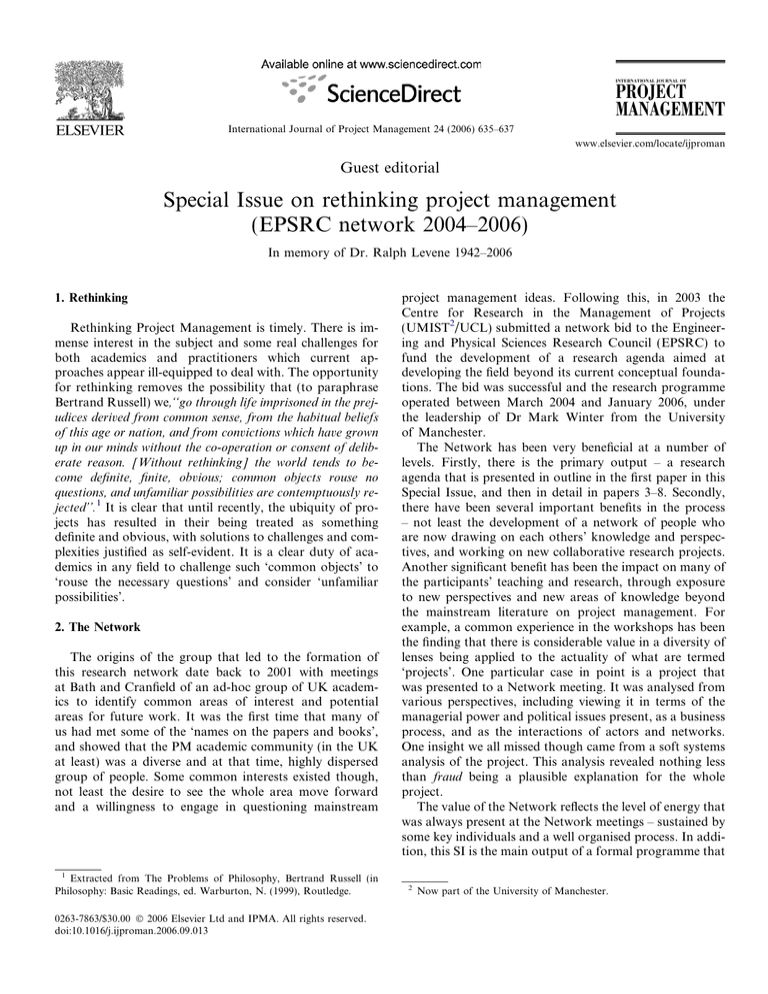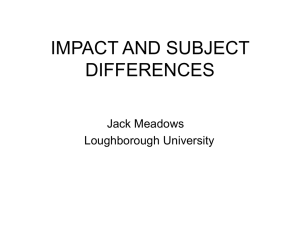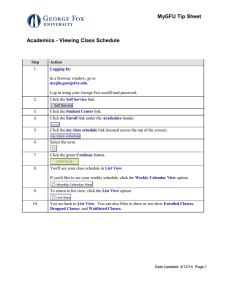
INTERNATIONAL JOURNAL OF
PROJECT
MANAGEMENT
International Journal of Project Management 24 (2006) 635–637
www.elsevier.com/locate/ijproman
Guest editorial
Special Issue on rethinking project management
(EPSRC network 2004–2006)
In memory of Dr. Ralph Levene 1942–2006
1. Rethinking
Rethinking Project Management is timely. There is immense interest in the subject and some real challenges for
both academics and practitioners which current approaches appear ill-equipped to deal with. The opportunity
for rethinking removes the possibility that (to paraphrase
Bertrand Russell) we,‘‘go through life imprisoned in the prejudices derived from common sense, from the habitual beliefs
of this age or nation, and from convictions which have grown
up in our minds without the co-operation or consent of deliberate reason. [Without rethinking] the world tends to become definite, finite, obvious; common objects rouse no
questions, and unfamiliar possibilities are contemptuously rejected’’.1 It is clear that until recently, the ubiquity of projects has resulted in their being treated as something
definite and obvious, with solutions to challenges and complexities justified as self-evident. It is a clear duty of academics in any field to challenge such ‘common objects’ to
‘rouse the necessary questions’ and consider ‘unfamiliar
possibilities’.
2. The Network
The origins of the group that led to the formation of
this research network date back to 2001 with meetings
at Bath and Cranfield of an ad-hoc group of UK academics to identify common areas of interest and potential
areas for future work. It was the first time that many of
us had met some of the ‘names on the papers and books’,
and showed that the PM academic community (in the UK
at least) was a diverse and at that time, highly dispersed
group of people. Some common interests existed though,
not least the desire to see the whole area move forward
and a willingness to engage in questioning mainstream
1
Extracted from The Problems of Philosophy, Bertrand Russell (in
Philosophy: Basic Readings, ed. Warburton, N. (1999), Routledge.
0263-7863/$30.00 Ó 2006 Elsevier Ltd and IPMA. All rights reserved.
doi:10.1016/j.ijproman.2006.09.013
project management ideas. Following this, in 2003 the
Centre for Research in the Management of Projects
(UMIST2/UCL) submitted a network bid to the Engineering and Physical Sciences Research Council (EPSRC) to
fund the development of a research agenda aimed at
developing the field beyond its current conceptual foundations. The bid was successful and the research programme
operated between March 2004 and January 2006, under
the leadership of Dr Mark Winter from the University
of Manchester.
The Network has been very beneficial at a number of
levels. Firstly, there is the primary output – a research
agenda that is presented in outline in the first paper in this
Special Issue, and then in detail in papers 3–8. Secondly,
there have been several important benefits in the process
– not least the development of a network of people who
are now drawing on each others’ knowledge and perspectives, and working on new collaborative research projects.
Another significant benefit has been the impact on many of
the participants’ teaching and research, through exposure
to new perspectives and new areas of knowledge beyond
the mainstream literature on project management. For
example, a common experience in the workshops has been
the finding that there is considerable value in a diversity of
lenses being applied to the actuality of what are termed
‘projects’. One particular case in point is a project that
was presented to a Network meeting. It was analysed from
various perspectives, including viewing it in terms of the
managerial power and political issues present, as a business
process, and as the interactions of actors and networks.
One insight we all missed though came from a soft systems
analysis of the project. This analysis revealed nothing less
than fraud being a plausible explanation for the whole
project.
The value of the Network reflects the level of energy that
was always present at the Network meetings – sustained by
some key individuals and a well organised process. In addition, this SI is the main output of a formal programme that
2
Now part of the University of Manchester.
636
Guest editorial / International Journal of Project Management 24 (2006) 635–637
finished in January 2006. To have this published in such a
short time was a stated objective at the outset – this must
be timely (who says academics never deliver anything
quickly . . .). This is entirely attributable to the willingness
of the authors and reviewers to engage in this process.
3. This Special Issue
The objective of this Special Issue is to capture the essence of these Network discussions (see www.rethinkingpm.org.uk) to codify the current state of the themes
identified and then provide a research agenda for each
theme. This should be seen as mirroring a new product
development process. At the outset of developing a new
product, it is not unusual for some basic research to be
undertaken. This is not commercial in itself, but provides
a foundation for the development that follows. The work
here is comparable to such basic research and is of great
importance not only to the academic community in shaping a research agenda for the future, but also to the practitioner community in providing the basis for the next
generation of ideas that will begin to tackle some of the
challenges faced.
And so to the papers. The first paper is a summary of
the Network’s main findings – a framework of five directions identified by the Network for, as they put it, ‘developing the area intellectually’. These areas are project
complexity, social process, value creation, conceptualisation and practitioner development. Each of these has an
impact on the themes that were identified as being key: projectification, programmes, the actuality of projects, uncertainty, business projects, professionalisation and
practitioner development.
The second paper describes the whole ‘rethinking’ process and provides some insightful reflections from key actors in this process. This is of importance to researchers
not only in this field, but in other fields concerned with
engaging in such a rethink. Methodologically, the process
has worked incredibly well, though the authors are
overly-modest about the high level of scholarly, organisational and facilitative effort that was needed to direct and
sustain the process. It is significant as it provides the first
documented cases in Project Management of the co-production of knowledge with academics, practitioners and
consultants working together.
The rest of the papers relate to the 7 thematic areas identified by the Network. Paper 3 combines the two themes of
projectification and programmes. In considering projectification, it discusses the role that projectification has taken
in the organisation of work since the term was coined in
Midler’s 1995 article.3 Projectification is not without its
critics however, and its onward march needs careful evaluation, not least because of the incredible diversity of human
3
Midler, C. (1995), ‘‘Projectification’’ of the Firm: the Renault Case’’,
Scandinavian Management Journal, vol. 11, No. 4, pp. 363–375.
endeavours that are being labelled as projects. During the
Network discussions, it became clear that not only has projectification continued since 1995, but that organisations
are using programmes and portfolios of programmes as a
means of ‘managing’. This, the authors have termed ‘programmification’ and have put this as an organisational phenomenon on the research agenda.
Paper 4 concerns the actuality of projects. This is fundamental for researchers and those involved in management
development. Unless we understand the reality of the environment well, there is little chance that approaches to assist
managers in dealing with this actuality will be effective.
Consistent with the opening quotation, PM has many beliefs that have grown-up seemingly without the direct intervention of deliberate reasoning. Project tool-sets that are
treated as self-evident and limited perspectives standing
as complete truths should be re-thought. This paper provides a map for moving research forward towards better
understanding the realities of the project environment.
Paper 5 describes a variety of approaches to another
fundamental aspect of projects – the uncertainty of the future. Current approaches are shown to be deficient in both
recognising and managing fundamental uncertainties, and,
taking up some of the themes from the previous paper, that
these approaches need to recognise the social nature of
projects and the existence of many ‘soft projects’ – a recognition of a departure from the deterministic engineeringbased models of the past.
Paper 6 continues to broaden the scope of PM, by considering that modern projects are increasingly about value
creation, organisational change, the provision of business
solutions and long-term benefits. The implication of this
is that considering projects just in terms of the delivery of
a single product is no longer appropriate. This broader vision incorporates elements of service delivery, organisational change, organisational strategy and operational
processes.
Paper 7 considers the role of the professional associations in PM. These are large and influential organisations
who through their bodies of knowledge and certification
programmes, have contributed significantly to the dominant paradigm of PM. An unfortunate by-product of this
is the closing down of the subject, a limiting of the scope
of discussion and input from research both directly in
PM and other management and social science disciplines
more generally. Consistent with the themes of the other papers, the authors use a broader conceptualisation of projects than previously used, and provide a research agenda
on this basis. It will be interesting to see whether this does
provide a challenge to the professional associations.
Continuing with the theme of the impact of the work
of the Network on practice in general, the final paper considers the implications for practitioner development. Over
recent years, a significant industry has built up around
developing practitioners, both through education and
training. Given the broader conceptualisation of projects
expressed in the previous papers, what are the implica-
Guest editorial / International Journal of Project Management 24 (2006) 635–637
tions now for training and development, and specifically,
how should such a change be reflected? There is always
the option to do nothing and make no change, though
this would perpetuate approaches that have been questioned consistently, not least in this paper and this Special
Issue more generally. Instead, the authors demonstrate
that there are already in place some responses to the
change, encouraging critical discourse at a number of levels. In addition to the benefits that the authors show, this
has great potential to contribute to the ground-up development of the subject area, as practitioners are engaged
with academics in the production of new knowledge. This
has to be a good thing.
4. Conclusion
So, what have we rethought? PM has been dominated by
a number of paradigms – practices dominated by the professional bodies of knowledge, and an intellectual base
challenged by the knowledge creation processes that generated it. The rethink has produced an agenda – and as such
presents an exciting opportunity across all of the 5 directions and 7 themes discussed here for the academic community. In my view, it parallels that presented to the
operations management community during the late 1980s
and early 1990s, where practical needs to improve performance engaged an academic community. In doing so, the
practical and intellectual relevance of the subject was established and operations management became a corner-stone
of modern business consideration, drawing from and linking into almost all management disciplines in the process.
As a community of academics, we need to continue to
ask the questions and test unfamiliar possibilities. These
hold the opportunities for the development of both the
knowledge base and its contribution to both the taught
subject and practice.
In Memoriam
It is with great sadness that the PM community learned
of the death of Dr Ralph Levene on 7th August, 2006.
Ralph had been part of the Network that this SI reports
on, and a great supporter of its aims. He also contributed
both to the writing of paper 6 and to the reviewing of one
other, despite his poor health at the time. His experience,
enthusiasm, knowledge and sense of humour will be missed
by us all in the Network. His work was enormously impor-
637
tant in his life and he has enthused, amused and made us
think – whether we were colleagues, readers of his writings
or students in his classes. This Special Issue is dedicated to
his memory as a small tribute to that work.
Ralph joined the Cranfield School of Management is
April 1992 as Head of the Project Management Group.
He was appointed as Director of the MSc in Project Management and Academic Leader of six faculty members.
During his time at Cranfield School of Management he
established an excellent reputation as a lecturer, researcher
and consultant to global businesses on executive development. His expertise and interpersonal style will sorely be
missed by his colleagues and the School.
Business projects (as discussed in Paper 6) were clearly
an interest, though he could equally have provided commentary on projects as art, or as a game of football (a Leyton Orient game, naturally). The tributes from colleagues
around the world have been most touching – all explicit
in their having enjoyed working with Ralph in one of his
many incarnations – as consultant, lecturer or colleague.
Our condolences go to his wife, Tricia and his family.
May he rest in peace.
Acknowledgements
Dr Mark Winter who ‘herded the feral cats’ (as the
members of the network became referred to) masterfully
and always managed to pull the meetings together. Charles
Smith, for his sterling efforts in supporting Mark and helping to make sense of all the meeting output. The presenters
from various organisations who bared their souls to share
with us the reality of their experiences. Colleagues in the
Network who left egos at the door but brought in their
knowledge, intellects and enthusiasm. The EPSRC for
funding this work. The authors of the papers for doing
what they said they would do, and to the reviewers, who
provided their own unique insights and comments on what
we had done. Lastly, to Miles Shepherd and Rodney
Turner for supporting the idea of a Special Issue on the
work of the Network. Top people.
Harvey Maylor
Cranfield School of Management,
Cranfield, MK43 0AL,
United Kingdom
Tel.: +44 1234 751122; fax: +44 1234 751806
E-mail address: harvey.maylor@cranfield.ac.uk


